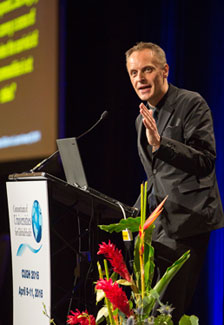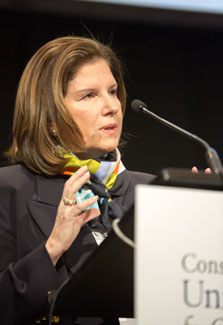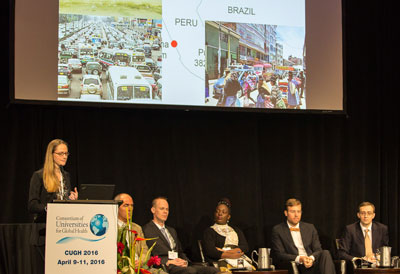Universities consider sustainable future in global health
May / June 2016 | Volume 15, Issue 3
By Ann Puderbaugh
SAN FRANCISCO - The symbiotic relationship between planetary health and human health was the overarching theme of the 7th annual Consortium of Universities for Global Health (CUGH) conference held in April. More than 1,800 attendees gathered in San Francisco for the three-day meeting, titled "Bridging to a Sustainable Future in Global Health."

Photo by Ross Marlow for CUGH
Attendees of the Consortium of
Universities in Global Health's (CUGH)
annual meeting were urged to consider a
more holistic approach by The Lancet's
editor, Dr. Richard Horton.
Envisioning a "realistic utopia" rooted in the idea of sustainable development, The Lancet's editor Dr. Richard Horton used his impassioned keynote address to urge the group to reimagine the idea of prosperity, strive to fill knowledge gaps and collaborate to more effectively implement what is already known.
"It's about the notion of intergenerational equity that future generations are as important as our own generation," Horton suggested. "It's about the oneness of all life on this planet and not only that, the symbiosis between life and our planet. It's also about the centrality of human systems - it is down to us to shape the future."
When global crises such as Ebola strike, those living in low-resource settings experience the greatest devastation, Horton said, noting that is when it's more important than ever for the global community to come together. "The problem is that when we see our global systems failing, or when people think they are failing, there is a temptation, an understandable temptation, to retreat into national isolation," Horton observed.
Horton and his colleagues on the Rockefeller Foundation-Lancet Commission on Planetary Health published a call to action in July 2015, asking the global community to adopt a more holistic approach to health.
The population explosion, escalating frequency and speed of global travel, increasing amount of livestock breeding, expanding destruction of the world's rainforests and other human behaviors contribute to the spread of infectious diseases, said Sir Richard Feachem, of the University of California, San Francisco, during a panel discussion. "It is a new age of pandemics," he continued, "they do keep coming and we live in apprehension of the big one."
Weak national health systems are a key problem in pandemic surveillance and response, given that only 20 percent of WHO member countries meet the organization's guidelines for core capacities, noted Jason Cone, director of the U.S. section of Doctors Without Borders. Many small outbreaks go unreported, he said, and there is no central validated database to track them.
"Our global health security architecture, while constantly improving, has some major cracks in the foundation when it comes to preparedness, surveillance, response and finally, the really broken state of affairs in the biomedical innovation system required to combat existing and emerging pathogens," said Cone. Currently, there is a failure to connect innovation to access, so advances often don't reach the patients in need, he added. With deadly outbreaks of preventable diseases such as measles going unchecked, Cone suggested priorities be reexamined. "It really thrusts to the attention a real question, about how realistic is it for us to confront some of these threats when so many of the diseases we already have viable countermeasures for are not reaching the people that need them the most."

Photo by Ross Marlow for CUGH
Dr. Maria Freire, President of the
Foundation for the NIH, said global
pandemic response capabilities must
be strengthened.
Pandemics should be viewed as a new dimension of global security with "deep societal impact and enormous economic consequences," said Dr. Maria Freire, president of the Foundation for the NIH and member of the Commission on a Global Health Risk Framework for the Future. The Commission, convened by the National Academy of Medicine, recently issued a report calling for a $4.5 billion investment to bolster global response capabilities. Disease outbreaks take a significant financial toll, Freire said, similar to terrorist attacks in that travel is restricted and commerce shuts down. And yet, as a society, we have chosen to prioritize our response to terrorism over pandemic preparedness, she added.
The NIH was well-represented throughout the conference, with separate satellite sessions hosted by the National Cancer Institute (NCI) and the National Institute of Allergy and Infectious Diseases (NIAID). Representatives from the National Institute of Mental Health (NIMH) and the National Heart, Lung and Blood Institute (NHLBI) also presented information on their global health research activities and upcoming funding opportunities. NHLBI staff highlighted a new program being established to expand low-income country capacity to conduct translational research, aimed at improving the uptake of proven-effective interventions into routine clinical practice.
During the proceedings, NIAID Director Dr. Anthony S. Fauci was honored as the 2016 John Dirks Canada Gairdner Global Health Award recipient. In his remarks, he addressed the "truly breathtaking" advances in the battle against HIV/AIDS but said implementation of the findings must be improved if the U.S. epidemic is to be brought under control. "Rwanda is doing much better than we are in terms of suppressing viral load," Fauci noted. "It's really embarrassing, and we need to do much better."
Globally, there are also "formidable obstacles" remaining in the battle against HIV, said Dr. Peter Piot, in a panel discussion that followed. Flat funding, sustainable drug supplies and retention of HIV-positive people in treatment are some of the challenges he detailed. Also troubling, advocates and funders have lost the sense of urgency and in some cases dropped HIV from the agenda. "The message on the end of AIDS has been quite counterproductive," he observed. "We see lots of countries in Europe, where the perception is, it's over."

Photo by Ross Marlow for CUGH
Alumni of Fogarty's Global Health Program for Fellows and Scholars
discussed their research projects.
In another panel session, alumni of Fogarty's Global Health Program for Fellows and Scholars presented the results of their research on topics such as the role of stigma in HIV transmission in Kenya, trauma systems development and care in Ghana, and drug use and HIV treatment in Indonesian prisons. "We feel that the greatest impact we can have on the global health community is through the training of researchers in the global health sphere, which provide tremendous returns on our investment," said Fogarty Director Dr. Roger I. Glass.
In an effort to significantly reduce indoor air pollution and lower cardiopulmonary risk in a rural community in Peru, one program participant is studying the use of gas-powered versus traditional biomass cookstoves. Dr. Catherine Miele, of Johns Hopkins University, said her Fogarty fellowship was an "incredible experience" that enabled her to learn to set up and run a field intervention trial. "Really, none of it would have been possible without having time, an extra year to do this research, so that as I continue with my medical training I can keep my foot in the research door." Miele and her colleagues plan to apply for additional Fogarty funding to scale up the project.
Sustainability and environmental impact are key to her initiative's success, said Miele. "I really benefitted from the collaborations on these studies working with environmentalists, behaviorialists and anthropologists, and this is really what ties it in to planetary health," she added. "Not only am I focused on getting the cardiopulmonary disease burden down on this study but how does it impact the community around it?"
More Information
To view Adobe PDF files,
download current, free accessible plug-ins from Adobe's website.